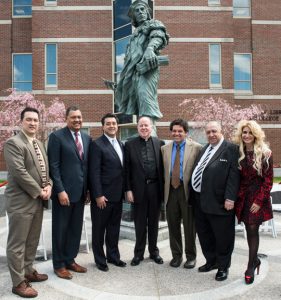Longtime BC Law supporters, the Privitera family has funded a sculpture of St. Thomas More that has now been installed on the BC Law campus.
Watch the statute being lowered into place
The commissioning of the statue by Bolivian-born sculptor Pablo Eduardo, who lives in Gloucester, is the most recent example of the Privitera family’s commitment to the Law School, which already benefits from the Francis D. Privitera ’56 Law Scholarship and the Philip Joseph Privitera ’95 Commencement Award. The statue bears a plaque in memory of Frank Privitera’s wife, Jean, who passed away in 2009, and includes the names of his children, Francis D. Privitera Jr. ’95, Philip Privitera ’95, and Jeannine Privitera.
Privitera has supported other artistic projects in the course of a long philanthropic career. He and his family commissioned a bronze statue of Dante that stands outside the Dante Alighieri Cultural Society in Cambridge. In 1995, Bernard Cardinal Law unveiled their gift to the Sacred Heart Church in Boston’s North End, a six-foot-high bronze relief dedicated to Bishop John Baptist Scalabrini, who sent the first Italian missionaries to America in the 1870s to care for Italian immigrants.
If the Scalabrini commission was a tribute to Privitera’s roots in the Sicilian immigrant community in Boston’s West End, the St. Thomas More project is testimony to the ideals and ethics that BC Law has instilled in two generations of his family. BC Law, said Philip Privitera, reinforced his family’s tradition of responsibility to their community, “a responsibility to do something other than just make money with the practice of law.”
As a child growing up in Boston’s West End, Frank Privitera learned more about making ends meet by shining shoes and delivering newspapers, than about making money and practicing law. “I didn’t even know what a lawyer was,” said Privitera, who has spent over fifty years in legal practice, commercial ventures in real estate and computers, and philanthropy.
“Where I came from, when you reached sixteen or seventeen, you went to work,” Privitera said. His father had a fishing boat and expected his sons to work with him. Frank was the first member of his family to graduate high school, and it was only with extreme reluctance that his father, who had no formal schooling, was persuaded by a family friend and the local undertaker Joseph Russo, to let him attend Northeastern University. On the way to school the first day, Russo gave Frank a ride in his undertaker’s limo, one of the few cars in the neighborhood.

“You’re going to hear a lot of name calling,” Russo warned. “There aren’t too many kids at school with vowels at the end of their names.”
Privitera vowed that his own three children would grow up in an environment where everybody goes to college, but at the same time, he wanted them to develop the toughness and self-reliance that he had learned as a streetwise shoeshine boy. So although Philip lived in Arlington and went to Belmont Hill School, “that didn’t prevent my father from asking me to paint dumpsters and renovate apartments and do tile jobs,” Philip said.
Another lesson that Privitera wanted to pass on was something he had learned from his own father: the importance of generosity. His eyes still fill with tears when he remembers one Thanksgiving during the Depression, when his father went out to buy a turkey. He came home empty-handed, having given it away to another family. “They needed it more,” he told his wife. And although his own experience of getting and giving was very different from that of his son and grandsons, surely the elder Privitera would approve of Pablo Eduardo’s sculpture, which has already become a focal point on the Law School campus in Newton.

